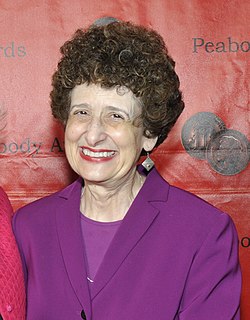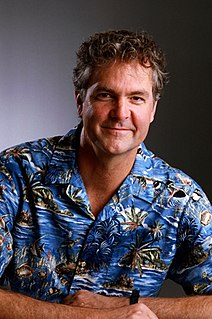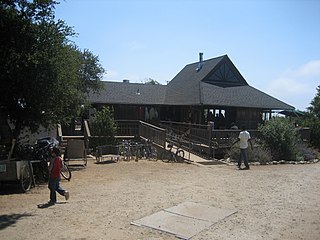
The University of California, Santa Cruz is a public land-grant research university in Santa Cruz, California. It is one of the ten campuses in the University of California system. Located on Monterey Bay, on the edge of the coastal community of Santa Cruz, the campus lies on 2,001 acres (810 ha) of rolling, forested hills overlooking the Pacific Ocean.

Benjamin F. Porter College, known colloquially as Porter College, is a residential college at the University of California, Santa Cruz. It is located on the lower west side of the university, south of Kresge College and north of Rachel Carson College. The college was founded in 1969 as College Five and formally dedicated on November 21, 1981. On that day the college was given the motto Ars Longa, Vita Brevis, and a series of college symbols, including a faculty mace and a college bell, were inaugurated.
Interactive storytelling is a form of digital entertainment in which the storyline is not predetermined. The author creates the setting, characters, and situation which the narrative must address, but the user experiences a unique story based on their interactions with the story world. The architecture of an interactive storytelling program includes a drama manager, user model, and agent model to control, respectively, aspects of narrative production, player uniqueness, and character knowledge and behavior. Together, these systems generate characters that act "human," alter the world in real-time reactions to the player, and ensure that new narrative events unfold comprehensibly.

Crown College is one of the residential colleges that makes up the University of California, Santa Cruz, United States.

Janet Horowitz Murray is an American professor in the School of Literature, Media, and Communication at the Georgia Institute of Technology. Before coming to Georgia Tech in 1999, she was a Senior Research Scientist in the Center for Educational Computing Initiatives at MIT, where she taught humanities and led advanced interactive design projects since 1971. She is well known as an early developer of humanities computing applications, a seminal theorist of digital media, and an advocate of new educational programs in digital media.

Façade is an artificial-intelligence-based interactive story created by Michael Mateas and Andrew Stern. It was the winner of the Grand Jury Prize at the 2006 Slamdance Independent Games Festival and has been exhibited at several international art shows. In 2010, it was included as one of the titles in the book 1001 Video Games You Must Play Before You Die.

The Baskin School of Engineering is the school of engineering at the University of California, Santa Cruz. It consists of six departments: Applied Mathematics, Biomolecular Engineering, Computational Media, Computer Science and Engineering, Electrical and Computer Engineering, and Statistics.
History of Consciousness is the name of a department in the Humanities Division of the University of California, Santa Cruz with a 50+ year history of interdisciplinary research and student training in "established and emergent disciplines and fields" in the humanities, arts, sciences, and social sciences based on a diverse array of theoretical approaches. The program has a history of well-known affiliated faculty and of well-known program graduates.
Action selection is a way of characterizing the most basic problem of intelligent systems: what to do next. In artificial intelligence and computational cognitive science, "the action selection problem" is typically associated with intelligent agents and animats—artificial systems that exhibit complex behaviour in an agent environment. The term is also sometimes used in ethology or animal behavior.
In artificial intelligence, reactive planning denotes a group of techniques for action selection by autonomous agents. These techniques differ from classical planning in two aspects. First, they operate in a timely fashion and hence can cope with highly dynamic and unpredictable environments. Second, they compute just one next action in every instant, based on the current context. Reactive planners often exploit reactive plans, which are stored structures describing the agent's priorities and behaviour.

AgentSheets was one of the first modern block-based programming language for kids. The idea of AgentSheets was to overcome syntactic challenges found in common text-based programming languages by using drag and drop mechanisms conceptualizing commands such as conditions and actions as editable blocks that could be composed into programs. Ideas such as this are used in various other programming languages, such as Scratch. AgentSheets is used to create media-rich projects such as games and interactive simulations. The main building blocks of AgentSheets are agents which are interactive objects programmed through rules. Using conditions agents can sense the user input including mouse, keyboard and in some versions even speech recognition and web page content. Using actions agents can move, produce sounds, open web pages, and compute formulae.
The UCSC Silicon Valley Initiatives are a series of educational and research activities which together increase the presence of the University of California in Silicon Valley. To that end, UC Santa Cruz has set up a 90,000 square-foot satellite campus called the University of Santa Cruz Silicon Valley Campus (SVC), currently located on Bowers street in Santa Clara, California, where it has been since April 2016 The Initiatives, still in the early stages of their development, have had ambitious hopes attached to them by UCSC, among them the possibility of a home for the University's long-planned graduate school of management and the Bio|Info|Nano R&D Institute. It currently houses professional the SVLink incubator-accelerator program, programs and a distance education site for the UCSC Baskin School of Engineering, the UCSC Silicon Valley Extension, the Office of Industry Alliances and Technology Commercialization leadership, and the University of California's online learning program, UC Scout.

David Haussler is an American bioinformatician known for his work leading the team that assembled the first human genome sequence in the race to complete the Human Genome Project and subsequently for comparative genome analysis that deepens understanding the molecular function and evolution of the genome.

Claire Ellen Max is a Professor of Astronomy and Astrophysics at the University of California, Santa Cruz (UCSC) and is affiliated with the Lick Observatory. She is the Director of the Center for Adaptive Optics at UCSC. Max received the E.O. Lawrence Award in Physics.
E. James Whitehead is Professor and Chair of Computational Media at the University of California, Santa Cruz, United States. He served as the Chair of the Computer Science department University of California, Santa Cruz from 2010 to 2014. He received a BS in Electrical Engineering from the Rensselaer Polytechnic Institute in 1989, and a PhD in Information and Computer Science from the University of California, Irvine, in 2000.

The UC Santa CruzCenter for Agroecology is a research, education, and public service organization within the Division of Social Sciences at the University of California, Santa Cruz.
Cybermethodology is a newly emergent field that focuses on the creative development and use of computational and technological research methodologies for the analysis of next-generation data sources such as the Internet. The first formal academic program in Cybermethodology is being developed by the University of California, Los Angeles.
Noah Wardrip-Fruin is a professor in the Computational Media department of the University of California, Santa Cruz, and is an advisor for the Expressive Intelligence Studio. He is an alumnus of the Literary Arts MFA program and Special Graduate Study PhD program at Brown University. In addition to his research in digital media, computer games, and software studies, he served for 10 years as a member of the Board of Directors of the Electronic Literature Organization.

The UC Santa Cruz Banana Slugs are the athletic teams that represent the University of California, Santa Cruz. The Banana Slugs compete in Division III of the NCAA, mostly in the Coast to Coast Athletic Conference (C2C). There are fifteen varsity sports – men's and women's basketball, tennis, soccer, volleyball, swimming and diving, cross country, and women's golf. UCSC teams have been Division III nationally ranked in tennis, soccer, men's volleyball, and swimming. UCSC maintains a number of successful club sides.
The UC Santa Cruz Genomics Institute is a public research institution based in the Jack Baskin School of Engineering at the University of California, Santa Cruz. The Genomics Institute's scientists and engineers work on a variety of projects related to genome sequencing, computational biology, large data analytics, and data sharing. The institute also maintains a number of software tools used by researchers worldwide, including the UCSC Genome Browser, Dockstore, and the Xena Browser.










